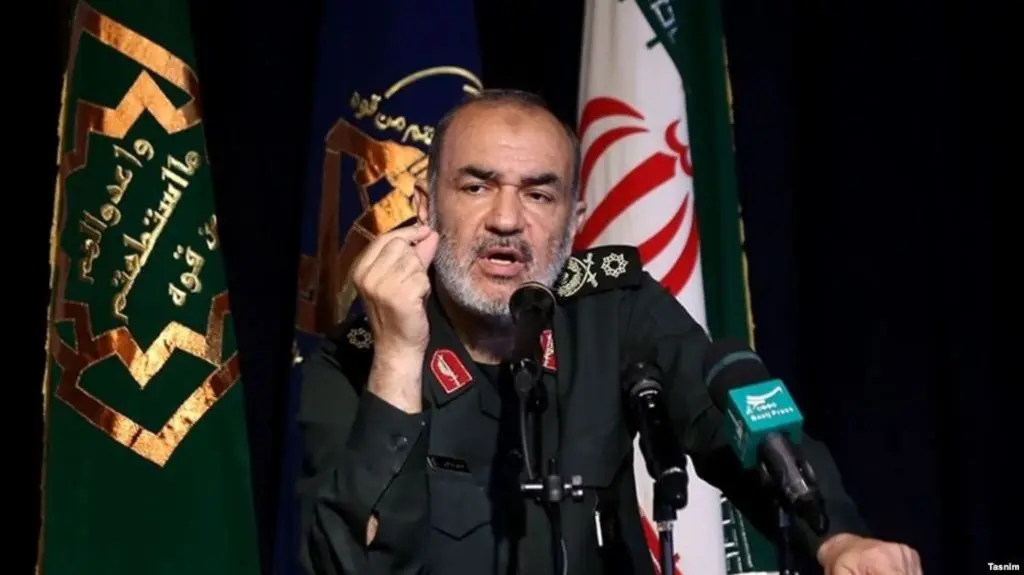
In a surprise announcement on 22 April 2019, Iran’s Supreme Leader Ayatollah Ali Khamenei appointed Major General Hossain Salami as the new head of the elite Islamic Revolutionary Guard Corps (IRGC).
The appointment came weeks after the United States (US) designated the elite force as a foreign terrorist organization and a year ahead of the official end of the tenure of Salami’s predecessor, Mohammad Ali Jafari.
The events are certainly linked. Given Salami’s more hardline stance and provocative rhetoric compared to Jafari, the change of command is widely seen as Iran’s latest attempt to counter the US’ ‘maximum pressure’ approach as well as internal challenges to the stability of the Islamic regime.
Moreover, as a veteran member of the IRGC with a background in defence management, Salami is arguably better suited to military leadership and strategization. This signals a potential shift in focus for the IRGC towards military and security affairs and away from the economy, in which it has historically been heavily involved.
Although little information is available about Salami’s early and personal life, it is known that he was born in 1960 in Isfahan, in central Iran. In 1979, at the age of 18, he was accepted to study mechanical engineering at the Iran University of Science and Technology. This coincided with the Islamic Revolution.
Two years after the Islamic Revolution, the new leadership initiated the so-called cultural revolution with the aim of bringing higher education curricula in line with Islamic values. The same year, Salami joined the IRGC, which was formed to protect the revolution and, later, to fight the Iraqi invasion.
Joining the IRGC was the biggest choice of Salami’s life. Like most of his colleagues, his first years were spent on the battlefields of the Iran-Iraq war (1980-1988). As the newly formed paramilitary force was filled with enthusiastic youngsters, Salami quickly rose through the ranks. His main posts during the war included commander of Karbala Division, commander of the 14th Imam Hussain Division and commander of the Noah Headquarter. He fought alongside his soldiers, and his passionate and down-to-earth personality made him well liked.
After the war, Salami went back to school but enrolled in the Faculty of Commandership (DAFOS) in Tehran, graduating with a master’s degree in defence management. He got a job lecturing at the National Defence University in Tehran and established and oversaw the ‘high war course’ for five years (1992-1997). He subsequently served as deputy head of the IRGC’s joint staff for eight years (1997-2005) and commander of the IRGC’s air force for four years (2005-2009). In 2009, at the age of 49, he was appointed deputy head of the IRGC. Now, ten years later, he holds the corps’ top job.
He is famous for his controversial and often hawkish statements, particularly against Israel and the US, which have won him both fans and fierce critics. He has “welcomed war with the United States” on several occasions, even suggesting it in the lead up to the 2015 nuclear agreement.
More recently, in response to threats made by Israeli Prime Minister Benjamin Netanyahu, Salami said that instead of threats, Netanyahu should practice swimming in the Mediterranean – indicating the possible repercussions of an Israeli attack on Iran. And in February, he warned that if Europe conspires to disarm Iran of missiles, Tehran will be forced to increase its missile range beyond the current limits. Iran’s missile capability is “unstoppable and uncontainable,” he said.
Yet despite Salami’s almost 40-year record of military service and skills for the job – at least in the eyes of the country’s leaders – he is only one of the nine major generals, any one of whom could have been appointed.
Thus, Salami’s selection may have political roots. The IRGC-linked newspaper Jahan, for example, claimed that Salami’s new position marks an era of a ‘more clear confrontation’ with the US and Israel.
Indeed, he has long advocated the development of Iran’s deterrence capabilities and defensive means. As commander, he is expected to double down on developing Iran’s ballistic missile programme as well as supporting its regional allies and militias.
Salami will also oversee the activities of the Quds Force, an IRGC unit responsible for extraterritorial operations, giving him a significant say in the way Iran’s network of regional alliances work. However, as organizations under new management usually take time to stabilize, it is too early to say how the change at the top will ultimately affect Iran’s strategy, particularly towards its foreign enemies.


